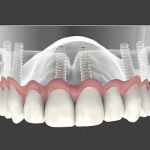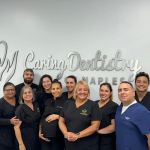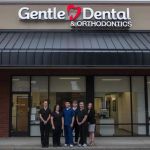
Managing Missing Teeth with Dental Prosthetics: Solutions for a Healthier Smile
When I first lost a tooth, I was embarrassed and self-conscious about my smile. I never imagined how one missing tooth could affect so many aspects of my life. From speaking to eating, the discomfort and inconvenience were constant reminders of my dental issue. Eventually, after visiting my dentist and learning about the different dental prosthetic options, I realized that there were effective solutions that could restore both my smile and my confidence. If you’re in a similar situation, this article will guide you through how to manage missing teeth with dental prosthetics, including what options are available and how they can benefit your oral health.
1. Understanding Dental Prosthetics
The term "dental prosthetics" refers to artificial devices that are used to replace missing teeth. These devices not only help restore your smile but also improve your ability to chew and speak clearly. I learned that dental prosthetics come in various forms, each suited to different needs and preferences. My dentist explained that prosthetics are designed to be as close to natural teeth as possible, both in appearance and function. Over time, I came to appreciate how these devices have the power to improve not only my oral health but also my overall quality of life.
Dental prosthetics can be categorized into two main types: removable and fixed. Understanding the differences between these options helped me make an informed decision about which would be best for me.
2. Types of Dental Prosthetics
As I researched my options, I discovered that there are several types of dental prosthetics to consider, each with its own set of advantages. Here's a breakdown of the most common types:
1. Dentures
One of the first solutions I considered were dentures, which are removable prosthetics that replace missing teeth. Dentures can be partial, replacing only a few missing teeth, or full, replacing an entire arch of teeth. When I first got dentures, I was hesitant about how they would fit and feel, but my dentist made sure to custom-make them to ensure a comfortable and natural fit. The best part about dentures is that they are relatively affordable and can be easily adjusted if necessary.
Dentures are a great option for people with multiple missing teeth. They help restore your smile, improve your ability to chew, and even enhance facial appearance by providing support to the muscles around the mouth. I found that wearing dentures made a significant difference in my ability to enjoy food and speak clearly. Over time, I also got used to the process of removing them at night and cleaning them, which became part of my daily routine.
2. Dental Bridges
Another option I explored was dental bridges, which are fixed prosthetics used to replace one or more missing teeth. A bridge typically consists of a false tooth anchored to the adjacent natural teeth or dental implants. When my dentist recommended a dental bridge to replace one missing tooth, I was excited about the idea of having a more permanent solution. The bridge not only restored my smile but also prevented my remaining teeth from shifting out of place.
Dental bridges are a great solution for people who have one or two missing teeth in a row. They are designed to blend seamlessly with your natural teeth, and they can be more comfortable than removable dentures. However, the procedure to place a dental bridge usually requires shaving down the adjacent teeth to accommodate the bridge, which may not be suitable for everyone. I was glad to find that the results were aesthetically pleasing and functional.
3. Dental Implants
When I learned about dental implants, I was intrigued by the idea of a permanent and stable solution for my missing tooth. Dental implants are small titanium posts that are surgically placed into the jawbone, acting as artificial tooth roots. Once the implant has fused with the bone (a process called osseointegration), a crown is placed on top to restore the tooth’s appearance and function. The idea of a permanent tooth replacement appealed to me, especially since implants are considered one of the most durable and long-lasting solutions for missing teeth.
Dental implants offer a more permanent option than dentures or bridges, and they also help maintain bone density in the jaw. This is important because when teeth are lost, the jawbone can begin to shrink. Implants prevent this from happening, which is a key benefit I discovered during my consultation. Although implants are more expensive than other options, the long-term benefits made them an attractive choice for me, especially when considering their durability and the positive impact on my oral health.
3. Factors to Consider When Choosing a Dental Prosthetic
Choosing the right dental prosthetic depends on several factors. Over time, I learned that the decision isn’t always straightforward, and it's important to consider your specific needs, lifestyle, and budget. Here are some key considerations that I took into account when deciding which option was best for me:
1. Number of Missing Teeth
The number of missing teeth played a big role in my decision. If you have multiple missing teeth, dentures or a dental bridge may be a more suitable option. If you only need to replace one or two teeth, a dental implant could be a more permanent solution. When I only needed one tooth replaced, I found that an implant was the best option, as it didn’t require altering my healthy teeth. However, for larger gaps, a bridge or dentures may be more appropriate.
2. Budget
Cost was another important factor I had to consider. Dental implants tend to be more expensive upfront, although they are often a better long-term investment due to their durability. Dentures and dental bridges are typically more affordable options, but they may need to be replaced or adjusted over time. I weighed the initial costs against the long-term benefits and chose the option that aligned with both my budget and my oral health needs.
3. Comfort and Functionality
Comfort was a huge factor for me, as I didn’t want to choose an option that would be difficult to adjust to or uncomfortable in my daily life. For me, dental implants provided the most natural feel, as they acted like real teeth and didn’t move around. Dentures, on the other hand, can sometimes shift or feel bulky, which took some getting used to. When deciding which option was best, I made sure to discuss the pros and cons of each with my dentist and carefully considered how each prosthetic would impact my daily activities, such as eating and speaking.
4. Long-Term Care and Maintenance
Once I decided on a dental prosthetic, I learned that each type requires different levels of care and maintenance. I found that dental implants, while more durable, require regular checkups to ensure they’re properly maintained. Dentures, on the other hand, need to be removed and cleaned regularly to prevent plaque buildup and bacterial growth. I was also advised to follow good oral hygiene practices, such as brushing and flossing, even with prosthetics in place, to maintain the health of my gums and remaining teeth.
Regular dental visits are essential for monitoring the health of your prosthetic and ensuring that everything is functioning properly. I’ve made sure to schedule follow-up appointments with my dentist every few months to check the status of my dental implants and ensure my bridge and dentures fit properly.
5. The Emotional Impact of Missing Teeth
Aside from the functional benefits, I also realized that restoring my missing tooth had a profound emotional impact. Losing a tooth can affect your self-esteem and confidence, especially if the tooth is in a visible area. For me, having a dental prosthetic helped me regain my smile and feel more confident in social situations. I could enjoy meals without worrying about my dental health or feeling self-conscious when talking to others.
Dental prosthetics do more than just restore function—they also restore your sense of normalcy. If you’re dealing with missing teeth, know that you’re not alone, and there are many options available to help you manage your oral health and regain your smile.







 Montclair Perio & Implant Specialists: Anne Hartnett, DDS0.0 (0 review)
Montclair Perio & Implant Specialists: Anne Hartnett, DDS0.0 (0 review) Caring Dentistry of Naples5.0 (93 review)
Caring Dentistry of Naples5.0 (93 review) Gentle Dental Milwaukie3.0 (171 review)
Gentle Dental Milwaukie3.0 (171 review) Omaha Orthodontics5.0 (724 review)
Omaha Orthodontics5.0 (724 review) Dr. Patricia Turley /Manhattan Beach/South Bay/CA4.0 (30 review)
Dr. Patricia Turley /Manhattan Beach/South Bay/CA4.0 (30 review) Meridian Dental Care4.0 (100 review)
Meridian Dental Care4.0 (100 review) The Importance of Oral Health Education During Pregnancy for a Healthy Pregnancy
The Importance of Oral Health Education During Pregnancy for a Healthy Pregnancy Best Tips for Brushing Your Teeth Properly for Healthy Gums: Essential Techniques for Oral Health
Best Tips for Brushing Your Teeth Properly for Healthy Gums: Essential Techniques for Oral Health Why Skipping Dental Checkups Can Lead to Bigger Oral Health Problems
Why Skipping Dental Checkups Can Lead to Bigger Oral Health Problems Advantages of Porcelain Dental Restorations
Advantages of Porcelain Dental Restorations How Can Diabetes Cause Tooth and Gum Problems? Preventing and Managing Oral Health Issues
How Can Diabetes Cause Tooth and Gum Problems? Preventing and Managing Oral Health Issues Healthy Habits for Promoting Good Oral Health and Hygiene: Tips for a Healthy Smile
Healthy Habits for Promoting Good Oral Health and Hygiene: Tips for a Healthy Smile